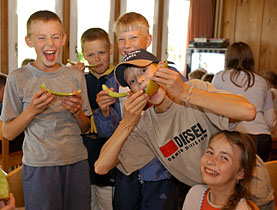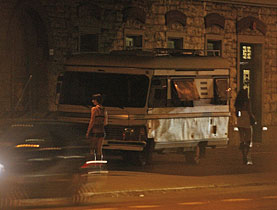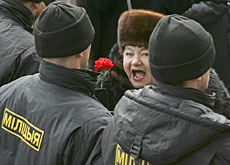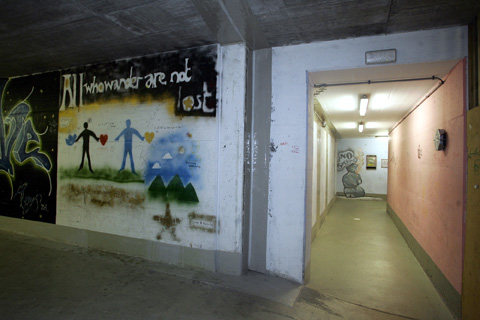Belarus ensures Chernobyl children return home

Belarus has tightened the rules governing holiday visits to Switzerland by children suffering from radiation after the Chernobyl power plant disaster.
The two countries signed a memorandum of understanding on Thursday that sets out legal requirements to protect the children while they are in Switzerland, and ensure they board a flight home at the end of their stay.
Every year Switzerland hosts several hundred Belarussian children aged seven to 18 who travel on rest and recreational trips organised by various organisations. The children mainly suffer from auto-immune deficiencies, the effect of radiation that is still present in Belarus after the meltdown of the Chernobyl nuclear reactor in neighbouring Ukraine in 1986.
Both the trip organisers and Belarus agree the visits give children the chance to spend time outdoors, eat well, and see a different culture. The time away from radiation is also believed to boost their immune systems.
But incidents of children not returning home after similar visits to Italy and the United States have led Belarus to set up legal provisions to stop the children from overstaying their visa or being kept with a view to adoption. Their safety also has been compromised, according to the Belarus Embassy in Bern.
Defending children
“We have had at least two cases which were not very pleasant for us,” Igor Sekreta, First Secretary-Consul of the Embassy of Belarus in Bern, told swissinfo.ch.
In one situation in Italy the temporary foster parents of an orphaned girl refused to send the ten-year-old back to her orphanage in Minsk, saying she had been sexually abused there. She was hidden in a village near the Italian-Swiss border but was tracked down and taken into police custody.
In another case in the US a teenage girl staying with an American family decided she did not want to go back to Belarus. Intense diplomatic efforts ensued between Washington DC and Minsk, resulting in the girl returning to her homeland.
“This is the context which forced us to conclude agreements with foreign partners. The legislative basis was missing,” explained Sekreta. “We have to defend our children because they cannot defend themselves.”
“We are not against the recreational trips of our children but we want to be sure that they are safe and will be [staying in] good conditions and that they will return to Belarus.”
Safety clause
In the past the Belarussian president, Alexander Lukashenko, has asked for written guarantees from Switzerland that the children would be sent home after their trip, a demand initially rejected on the grounds it conflicted with Swiss law. But now a memorandum has been approved by the Swiss cabinet.
Similar agreements have already been signed with 11 other countries in Europe and discussions are underway with the US and Canada.
Belarussian Deputy Foreign Minister Andreï Evdochenko was in Bern to sign off on the document. The Swiss government said the agreement would pave the way for continued hosting of children.
“The agreement, established in the form of an exchange of notes, confirms the protection given to young people invited under Swiss law, but stipulates that the children staying in Switzerland are under guardianship and cannot become the object of an adoption procedure,” said a statement.
A safety clause has been included after one child drowned in a swimming pool and another was hit by a car, both instances taking place in Italy.
Regaining strength
Organisers of trips say just a few weeks away from the dangerously high levels of radiation the children are normally exposed to are enough to help reduce the concentrations in their bodies.
Veronika Reunschenbach of the Hardwald Chernobyl holiday project says they have never had a problem with a child staying beyond the expiry of their visa. The project also endeavours to find out about children’s backgrounds beforehand and their Swiss hosts are briefed that the visitors must return home.
The Pestalozzi Children’s Village Foundation in eastern Switzerland welcomes groups from Belarus five times a year. To date they have not had a problem with a child overstaying a visa and do not expect the new rules to affect their work.
But whatever the legalities, they say the visits are essential as the children gain physical and mental strength during their time in Switzerland.
“It is very important for them. They come not only to learn something but to recover,” said spokeswoman Carmelina Castellino.
Jessica Dacey, swissinfo.ch
On April 26, 1986, a reactor at the Chernobyl nuclear power plant in Ukraine melted down, sending a cloud of radioactive fallout over parts of the western Soviet Union, eastern Europe, Scandinavia, Britain and the eastern United States.
A 2005 report by the International Atomic Energy Agency attributes 56 deaths directly to the meltdown (47 accident workers and nine children with thyroid cancer).
It also estimates that as many as 4,000 people may ultimately die from long-term accident-related illnesses.
Canton Ticino reported the highest levels of radioactivity in Switzerland. Swiss authorities banned fishing on Lake Lugano and recommended that pregnant and breast-feeding mothers and small children avoid fresh milk and vegetables.
The government later had to compensate fishermen and farmers for loss of income.

In compliance with the JTI standards
More: SWI swissinfo.ch certified by the Journalism Trust Initiative





You can find an overview of ongoing debates with our journalists here. Please join us!
If you want to start a conversation about a topic raised in this article or want to report factual errors, email us at english@swissinfo.ch.